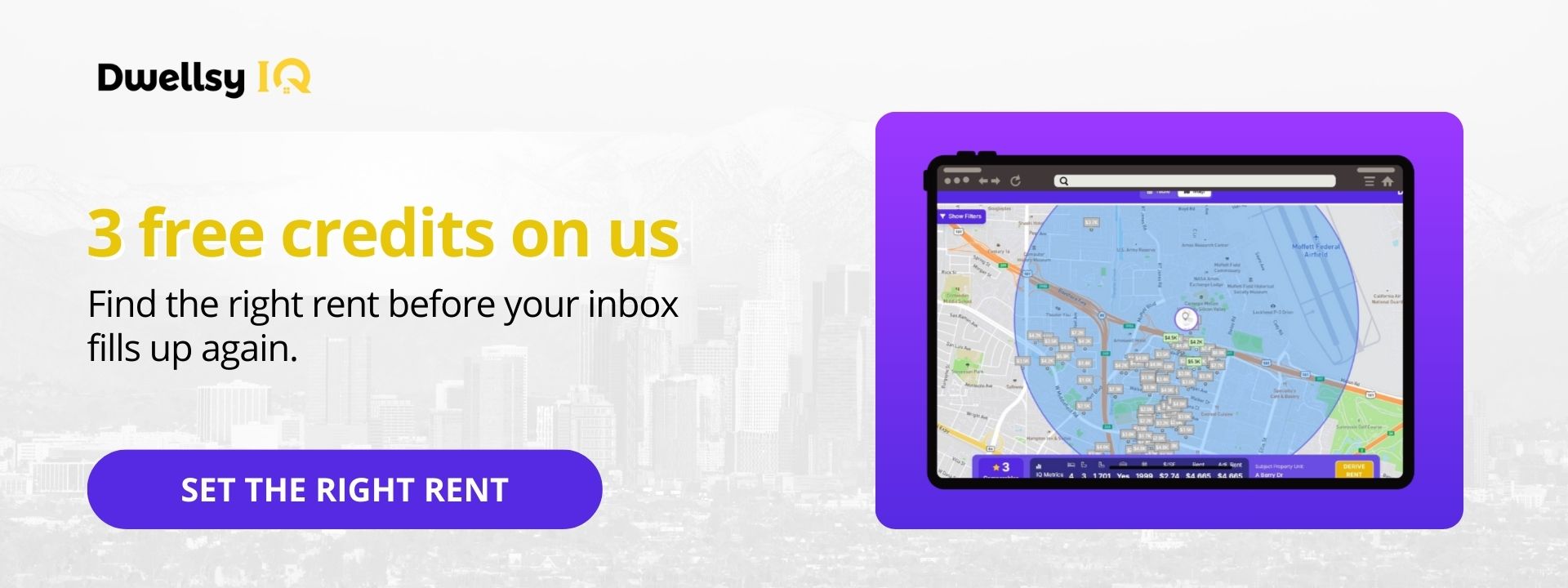Ever stared at a blank “Monthly Rent” field and second-guessed every number you typed? You’re not alone. Pricing rent is part art, part science (and the science side is getting better!). A rent calculator can turn scattered comps and gut feelings into a defensible number you can stand behind.
In this guide, we’ll explain what a rent calculator is, how it works behind the scenes, why accuracy matters, and which tools fit different needs. We’ll review Rentometer, CompIQ, and Zillow Rent Calculator, as well as pros, cons, and ideal use cases for each of them, and wrap with FAQs you can put to work today.
What is a rent calculator?
A rent calculator is a tool that estimates the monthly rent for a property based on comparable rentals (comps), location, and key attributes like bedrooms, bathrooms, property type, and amenities. It’s built to give landlords and property managers a data-backed starting point for pricing, way faster than manual comp gathering and more consistent than gut feel.
In practice, a good calculator:
- Sets the exact price that you should ask for instead of an estimated rent
- Shows comps and how your property stacks up
- Helps you adjust for features (number of bedrooms, square footage, garage)
- Offers enough transparency so you know how the number was produced
- Allows you to generate a report to show renters and owners
How does a rent calculator work?
Behind the scenes, rent calculators pull and process several data inputs to produce a defensible estimate. The best tools use both historical comps and current active listings to reflect the market “now,” not just last quarter.
The most common data sources are recent rental comps, active listings, property attributes (such as apartment, number of bedrooms, etc.), amenities (such as garage), and seasonality.
What once took hours of manual work, comping can now be done in minutes, delivering speed and consistency, with the same method producing repeatable results across different units. The process brings clarity too, providing a clear range supported by comps you can confidently share with owners, lenders, or your team.
For example, if you’re pricing a 2-bed house in Phoenix, the calculator finds 150 comps within 1 mile from the last 60 days, adjusts for in-unit garage, and suggests $2,180–$2,460 with medium confidence. For certain tools, such as CompIQ, it will suggest the exact rent, so instead of pricing it at $2,260, the tool identifies that you should charge exactly $2,420 based on the other properties. So instead of earning $27,120 per year, you’d earn $29,040, a 6.6% increase — and that would be defensible through the report generated.
Why accurate rent matters
Getting rent right affects your bottom line. When done accurately, you can:
- Lease up faster: The right price catches the eye of serious renters right away, so your property spends less time sitting empty and more time earning.
- Bring in higher effective rent: Pricing accurately means you won’t have to hand out as many concessions, and you’ll attract tenants who are ready (and happy) to pay what it’s worth — which means more income in your pocket.
- Keep tenants longer: When the rent feels fair for the value they’re getting, people are far more likely to stick around, saving you the hassle and cost of finding someone new.
- Plan smarter upgrades: Clear, reliable comps show you exactly which renovations or amenities will actually pay off, so you can invest with confidence instead of guessing.
On the other hand, getting the wrong rent can jeopardize your operations more than you might think:
- Overpricing: This will likely force you to offer concessions that eat into your revenue. The longer a listing stays on the market, the more it starts to look “off” to renters, which drags down lead quality.
- Underpricing: Just as damaging as overpricing, underpricing hurts your income because you leave money on the table every single month — and worse, you might pull down the perceived value of other similar units in your portfolio.
- Portfolio inconsistency: Without a clear, repeatable method, pricing becomes guesswork — often based on habit or opinion — which doesn’t scale, leaves plenty of room for costly mistakes, and can make renters hesitant.
Even small errors add up. A $75/month miss on a 24-unit building equals $21,600 in lost annual revenue. This is why accuracy matters.
Rent Calculator Tools
CompIQ
What it is:
A professional-grade platform for rent analysis and comp management. Designed for operators and landlords who want precision, control, and reporting.
Key features:
- Build large comp sets (often up to 250 properties)
- Advanced filtering by year built, square footage, and more
- Custom reports and consistent methodology for teams
- Portfolio and revenue strategy support
Pros:
- Set the exact rent with deep comp control and transparent methodology
- Strong for small property managers and serious landlords who want rigor
- Generates clean, board-ready reports to back decisions
- Your searches are stored in your account, so you can always go back to them
Cons:
- More features mean a learning curve, making it more complex
- Newer product, not as mature as some other options
Best for:
Owners and operators who need precision, consistency, and documentation across multiple units or buildings

Rentometer
Rentometer is a rent estimate tool that compares your property to nearby rentals and returns a quick range.
Key features:
- Address-based estimates and rent ranges
- Local comp snapshots with basic filtering
- Free tier with paid upgrades for deeper data
Pros:
- Fast and easy to use, great for a ballpark
- Clear visual benchmarks against neighborhood medians
- Free option for basic checks
Cons:
- Treat results as directional, not precise, giving ballparks
- Less nuance for amenities or unique unit features
- Data depth can vary in lower-density areas
- No report to share with renters and owners
- Data sources unclear
Best for:
New landlords and quick sanity checks in dense neighborhoods
Zillow Rent Calculator
What it is:
A renter-friendly tool for quick rent estimates and basic comparisons.
Key features:
- Rent estimate and simple range
- Side-by-side comparison of up to 5 properties with photos
- Broad address coverage and easy UI
Pros:
- Fast, familiar, and free
- Visual comparisons help understand how a unit “shows”
Cons:
- Designed for renters, not operators
- Five-property limit is too shallow for serious pricing work
- Limited control over comp selection, amenities, or concessions
- Limited data sources and quality
Best for:
Renters who want to compare rents and see how much they should pay, and a familiar brand is important to them
RentCast
What it is:
A rental analysis platform for landlords and real estate investors who want automated rent estimates, comps, and portfolio tracking without enterprise complexity.
Key features:
- Automated rent estimates by property details
- Rental comps with filters for attributes
- Portfolio tracking with rent adjustment alerts
Pros:
- Clean, easy-to-use interface
- Helpful for investors managing multiple units
- Provides local insights beyond national averages
Cons:
- Data sources not disclosed, accuracy can vary
- Automated estimates only, no manual comp adjustment
- Better for ballpark checks than defensible pricing
Best for:
Investors who need quick, automated rent insights and simple portfolio monitoring.
Which rent pricing software is the best?
The rent pricing tool that will fit your needs depends on the type of professional you are. If you’re a renter, Zillow Rental Calculator is the best alternative thanks to the key feature that allows properties to be compared side by side.
If you’re in a rush and only need a quick ballpark estimate, Rentometer is a good choice thanks to its ease of use. Just keep in mind it may not always capture the full earning potential of your property or minimize vacancy risk.
If you’re a property manager who wants to maximize income, lease your empty units quickly, or share reports with owners or renters to back up your pricing, CompIQ is a strong option. While it’s more complex than some tools, that depth can be useful when consistency and accuracy are priorities.
FAQs
How accurate are rent calculators?
The accuracy of rent calculators can vary a lot depending on the geographic context, the data sources they use, and the specific tool itself. In larger metropolitan areas with high listing volumes, rent calculators tend to be more reliable because they have a richer pool of data. In smaller cities, accuracy might drop.
How much could I charge for my rent?
It depends heavily on your location and local market conditions. A good alternative is to use a rent calculator, like CompIQ, to help you set the right rent by comparing with nearby properties.
What’s the best free rent calculator?
The best free rent calculator depends on what you need it for. If you’re looking for the most accurate and comprehensive option, CompIQ is the best option. If you just want a quick ballpark figure and don’t mind a simpler approach, Rentometer is fast and easy to use. On the other hand, if you’re a renter trying to compare properties side by side, Zillow’s Rental Calculator is a good fit.
Can I charge above market rent?
You can, but expect longer vacancy unless your property offers scarce features, such as garage parking in dense neighborhoods or a renovated unit near major transit. If inquiries stay slow after a week, lower in small steps ($25–$50) and monitor response.
How often should I update my rental price?
During active leasing, review weekly based on local inquiry volume and showing conversions. For renewals, reassess 60–90 days before lease-end with fresh comps and seasonal patterns, although the exact timing can also depend on the terms of the lease contract.




